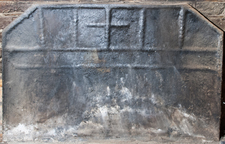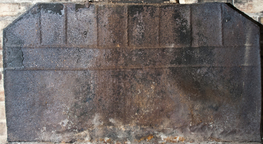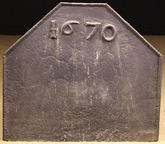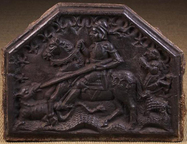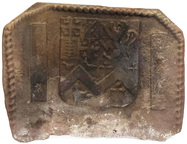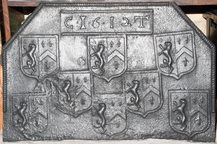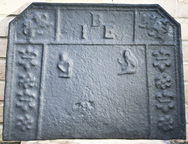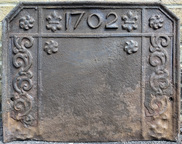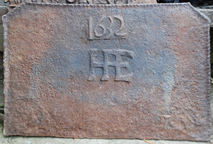-
766
Description: Canted rectangle; ovolo-moulded edging; shield and dolphin crown of the dauphin of France, encircled by the Ordre d'Esprit and the Ordre de St Michel; dolphins in the bottom corners, separating digits of the date.
Notes: The 24th Dauphin was Louis, son of Louis XV and father of Louis XVI. Part of the bequest to the Victoria and Albert Museum by Lieut. Colonel G. B. Croft-Lyons in 1926.
Inscription: 1 7 5 0
Arms: Dauphin of France (24th Dauphin)
- Decoration tags:
- rectangular with canted top corners (shape)
- ovolo (edging)
- whole carved pattern
- armorial
- royal
Manufactured: in 1750 in France.
Current location: Victoria & Albert Museum, Cromwell Road, Kensington & Chelsea, Greater London, England.
Museum number: M.625-1926 (part of the Victoria & Albert Museum museum group)
- Attached to series:
- Foreign armorial firebacks
-
1278
Description: Canted rectangular shape; twisted rope edging (top and sides only; two approximately parallel horizontal lines of twisted rope across the upper centre; from the upper line and starting at the top corners, five regularly-spaced vertical lines of twisted rope extending to the top edge, the centre one with a horizontal rope length formiong a cross.
Notes: A simple rope design with apotropaic significance.
- Decoration tags:
- rectangular with canted top corners (shape)
- rope (edging)
- simple stamps
- apotropaic
- objects
Manufactured: in the mid- to late-16th century possibly in the Weald area of England.
Current location: in private hands, Wadhurst, East Sussex, England.
- Attached to series:
- Rope design firebacks
-
1280
Description: Canted rectangular shape; twisted rope edging (top and sides); two approximately parallel horizontal lines of twisted rope across the upper centre; from the upper line and starting at the top corners, seven regularly spaced vertical lines of twisted rope extending to the top edge.
Notes: A simple rope design without apotropaic significance.
Copies of this fireback are known.
- Decoration tags:
- rectangular with canted top corners (shape)
- rope (edging)
- simple stamps
- objects
Manufactured: in the late-16th to early-17th century possibly in the Weald area of England.
Current location: in private hands, Wadhurst, East Sussex, England.
- Attached to series:
- Rope design firebacks
-
1020
Description: Canted rectangular shape; twisted rope edging (top and sides); top centre, date formed of individual numerals.
Notes: The '1' has a central button, typical of the period, or of a little earlier. Formerly at Padley Hall, Derbyshire. Wilkinson's, Doncaster, auction 24 Apr 2016 lot 317.
Inscription: 1670
- Decoration tags:
- rectangular with canted top corners (shape)
- rope (edging)
- individual numbers
- text
Manufactured: in 1670 in England.
Current location:, not known.
- Attached to series:
- Date only firebacks
-
1146
Description: Canted rectangular shape; astragal edging with repeated fleurs-de-lys inside top and side edges; figure of St George impaling a dragon to the left with a lance over an undulating ground, with a kneeling figure above a sheep to the right.
Notes: The mould for this unusual fireback may have been formed using a redundant carved, medieval wooden panel, perhaps from a church. Wilkinson's Auctioneers, Doncaster, 24 June 2018, lot 132.
- Decoration tags:
- rectangular with canted top corners (shape)
- astragal (edging)
- whole carved pattern
- pictorial
- mythological
- animals
- humans
Manufactured: in the 16th century in England.
Current location: not known.
- Attached to series:
- Miscellaneous pattern firebacks
-
1305
Description: Quasi-rectangular with canted top corners; twisted rope edging (top and sides); centre top, quartered shield between two vertical carved stamps of a billet with five oval shapes.
Notes: The arms are probably of Thomas Wriothesley, who was Henry VIII's last Lord Chancellor and created Earl of Southampton in 1547; he married c.1533 so the arms could date to before then, but the same arms are displayed on his enamelled stall plate in St George's Chapel, Windsor, of 1545, and in stained glass in a window in the parish church at South Warnborough, Hampshire. The shield is, quarterly, 1. Wrythe or Wriothesley quartering Dunstanville and Pink, 2. Drayton, 3. Crocker and 4. Peckham. A candidate for the earliest English fireback with an example of personal arms. It is possible that this casting is the one formerly at Warnham Court, Sussex, which was illustrated by J. Starkie Gardner in Country Life in 1907. A similar fireback is no. 334. William Smith Auctions, Plainfield, NH, 20 Nov 2024, lot 424 ($250).
Arms: Wriothesley (Earl of Southampton)
- Decoration tags:
- rectangular with canted top corners (shape)
- simple stamps
- carved stamps
- heraldic
- armorial
- objects
Manufactured: in the mid- to late-16th century in the Weald area of England.
Current location: not known.
Citation: Gardner, J. S., 25 May 1907, 'Old Wealden Ironwork at Warnham Court', Country Life, pp. 730-2.
- Attached to series:
- Wriothesley firebacks
- Royal series
- Personal armorial firebacks
-
1192
Description: Canted rectangular shape; twisted rope edging formed of six lengths of 23cm (top and sides); top centre, rectangular panel with cavetto-moulded edging (left side missing) enclosing date between initials CT, all interposed with dots; below, eight shields of Ayloffe impaling Sulyard in three rows (3-2-3); Ayloffe: sable, a lion rampant Or, collared gules, between three crosses formy of the second; Sulyard: argent, a chevron gules between three pheons inverted sable.
Notes: William Ayloffe (c1535-1584) of Bretons, Hornchurch, Essex, Justice of the Court of Queen’s Bench, married (c1560) Jane, dau. of Sir Eustace Sulyard, of Runwell, Essex. The initials 'CT' are likely to be those of Charles Tyler, a founder whose working life and that of his family have strong parallels with the occurrence of these firebacks. The excrescence affecting the left shield in the middle row and the blemish left of the middle shield in the top row are the result of inexpert ladling of the iron during casting. Previously at Smarden, Kent. The absence of the left side of the frame of the inscription panel has also been noted on another back in this series, also dated 1612.
Inscription: C.1.6.1.2.T
Arms: Ayloffe impaling Sulyard (William Ayloffe of Bretons, Hornchurch)
- Decoration tags:
- rectangular with canted top corners (shape)
- rope (edging)
- carved stamps
- individual letters
- individual numbers
- heraldic
- armorial
- text
Manufactured: in 1612 possibly at Bedgebury Furnace, Goudhurst in the Weald area of England.
Current location: in private hands, Crawley, West Sussex, England.
- Attached to series:
- Ayloffe series
- Personal armorial firebacks
-
1304
Description: Canted rectangular shape with inclined sides; cavetto-moulded edging (top and sides); horizontal fillet parallel to the top edge divided by two further fillets, in the centre the initials in capitals in triad, and at each end a lion rampant stamp facing inwards and inclined upwards towards the centre; below the lions, two inclined vertical fillets, parallel to the sides of the plate, each enclosing down the sides a double fleur-de-lys stamp and a flowerhead stamp repeated twice on each side and arranged alternately; in the panel below the initials, two different animal figures of indeterminate type, possibly monkeys.
Notes: The rampant lion, double fleur and flowerhead stamps have all been noted on other firebacks in a series identified on most backs with the initials I and B at the base of the plate. The initials are not present on this casting although the inclusion of I and B in the triad at the top could suggest that this fireback was personal to the founder and his wife. Of note are the impressions of the lions which overstamp the fillet below, indicating that they were placed after the fillet. Unlike the other backs in this series this example is undated. Wincanton Auctions, 24 Oct 2024, lot 540 (£35); Bellmans Auction, Wisborough Green, 13 May 2025, lot 562 (£60).
Inscription: IBE [triad]
- Decoration tags:
- rectangular with canted top corners (shape)
- cavetto (edging)
- carved stamps
- individual letters
- heraldic
- text
- animals
- plants
Manufactured: in the late-17th to early-18th century in the Forest of Dean area of England.
Current location: not known.
- Attached to series:
- IB series
- Fleur-de-lys firebacks
-
1313
Description: Canted rectangle; cavetto-moulded edging; three horizontal strips bearing a fine repeated ribbing: one horizontal below canted corners, and two vertical strips parallel to each side, dividing the fireback into two side panels, two top corner panels, top panel and main central panel; in each top corner panel a flower head stamp; top panel, date between a repeated double fleur-de-lys stamp; in each side panel, a stamp formed of an arrangement of scrolled tendrils, with a double fleur-de-lys stamp below; central panel, a flower head stamp in each top corner.
Notes: The divided structure of the decoration and the use of flower head and double fleur stamps places this fireback in the series identified on some castings with the initials IB. The tendril decoration in the side panels has not been seen on other backs in the series. Bellmans Auction, Wisborough Green, 8-10 Sep 2025, lot 703 (£30).
Inscription: 1702
- Decoration tags:
- rectangular with canted top corners (shape)
- cavetto (edging)
- carved stamps
- individual numbers
- heraldic
- text
- objects
Manufactured: in 1702 in the Forest of Dean area of England.
Current location: not known.
- Attached to series:
- IB series
- Fleur-de-lys firebacks
-
805
Description: Rectangular with canted top corners; twisted rope edging (top and sides); top centre, date formed from a single stamp, over-pressed; monogram below date.
Notes: Dates formed from a single stamp are uncommon, this series being distinguished by this practice.
Inscription: 1632 / HPE
- Decoration tags:
- rectangular with canted top corners (shape)
- rope (edging)
- carved stamps
- date stamp
- monogram
- text
Manufactured: in 1632 in the Weald area of England.
Current location: Yapton Metal Co., Yapton, West Sussex, England.
- Attached to series:
- 1630s HPE series

